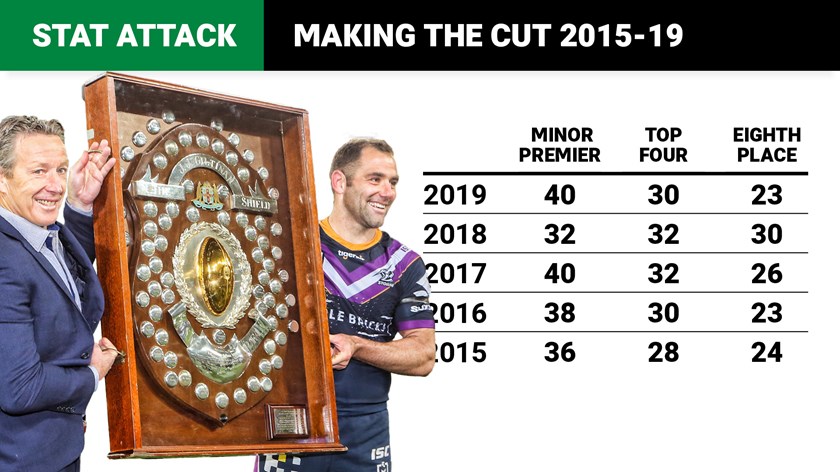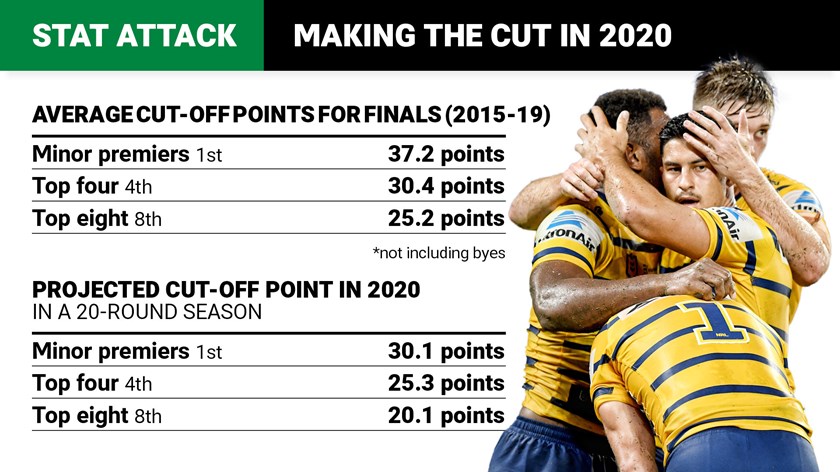The rescheduled 20-round NRL season presents a challenge to the six clubs that started the year 0-2 but those teams now have a much better chance of making the finals than the 15-week scenario which was previously a possibility.
Current state of play
After the first two rounds before the season was suspended due to the COVID-19 pandemic, the 16 teams fell into three groups – six started the year undefeated, four split their first couple of games and the other six failed to register a victory.
The premiers, the Sydney Roosters, were one of the six winless sides and their chairman Nick Politis had been vocal about wanting the Telstra Premiership ladder to be reset but the 20-round season announced last month means all teams still have a fair chance of making the playoffs.
The 20-round competition will feature each team playing each other team once, with a second game against five sides rather than the usual nine.
Effectively, the NRL has changed from a 25-week season including one bye for each team to a 20-round competition where there will be no spare weekends or points allocated for a bye.
- View the full 2020 draw
- Download a PDF of the draw
- Download the draw or your team's schedule into your calendar
The new season will create a slightly more congested competition table with four fewer games for the cream to rise to the top and strugglers to drop away.
Currently the six undefeated teams are one win ahead of eighth spot with 18 rounds to go, while the 1-1 sides are a win behind top spot but also just two competition points above the wooden spoon. And for the 0-2 sides, they have 18 weeks to make up the difference and claim the 10 wins likely needed to taste finals football.

With the lack of a bye having no impact on the ladder, there are now four fewer matches for teams to make up ground than before the hiatus but it is more manageable than the originally anticipated 15-round outcome.
What do the numbers say?
NRL.com crunched the numbers to determine the cut-offs for competition points in a bid to reach the top eight using results based on the last five years of ladder finishes.
From 2008 to 2017 (before the draw was condensed by a week in 2018), the magical number of 28 competition points (including byes) was often referred to as the benchmark for eighth spot, which equates to a 50% win rate (12 wins from 24 games, plus four points for byes). This effectively dropped to 26 with one bye in 2018-19, maintaining a 50% win-rate as the cut-off.
A reduced 20-round season would feature no bye rounds so this analysis has stripped bye round points from all averages.
Over the past five years, when teams have each played 24 games and had two weekends off for byes and the representative round each season, the minor premiers have finished on an average of 37.2 points.
Based on a 20-round competition, that equates to a baseline of 30.1 points to clinch top spot, so approximately 15 wins will be needed to collect the JJ Giltinan Shield.
To finish in the top four, from 2015-19 a tally of 30.4 points on average has been enough to get a double chance in the playoffs. If this year is just 20 rounds, teams are looking at 25 being the cut-off point, so 13 wins to guarantee a top-four spot or potentially one team to make it with a 12-8 record.
As far as eighth spot goes, the average number over the past five years has been 25.2,which means 20.1 points or at least 10 wins will likely be needed to get into the finals.

Teams like the Eels, Knights and Raiders, who lead the competition on for-and-against, are better placed than they would normally be after two rounds to reach the finals alongside fellow unbeaten sides Melbourne, Brisbane and Penrith.
Each of these clubs would potentially need eight more wins from their final 18 games based on this equation to book a post-season berth.
A 20-round scenario, with five rematches during the regular season rather than nine, is good news for a team like the Sea Eagles, who started the year at 1-1 after meeting competition heavyweights Melbourne and the Roosters in the opening rounds.
Likewise, Cronulla have started the year 0-2 but have already faced two of last year's top-four sides, South Sydney and the Storm.
For the teams that started the season with successive losses – Gold Coast, the Roosters, Cronulla, St George Illawarra, Canterbury and the Warriors – the equation is they have to win at least 10 games of the remaining 18 rounds or they will have little chance of qualifying for the finals.
Impact of the draw
With the draw now completed and venues locked in for the first nine rounds, we can start to assess which sides may have an easier or tougher time accruing those 10 vital wins.
One of the great unknowns for now is the home ground advantage, or lack thereof. With just six venues in action up until round nine due to biosecurity reasons, the Cowboys, Broncos, Storm, Eels and Wests Tigers are the only teams that will be playing from their official home ground in that period, although several teams had already lined up home games at Bankwest Stadium.
The Sharks had lost their home ground for the year due to renovations already but only the already-displaced Warriors plus the Knights and Sea Eagles (the three teams to play home games at Gosford), Raiders (Campbelltown) and the Titans (Suncorp) face anything more than a short bus trip to their temporary home ground (throw in the Dragons if you count Wollongong rather than Kogarah as their home base). Canberra's 2.5-hour drive is the longest of those.
It's game on
All supporters and players will be hoping both that the full suite of home grounds can be used later in the season and that fans will be present later on as well.
With crowds locked out at least in the short term, the advantages outside of travel to having a regular home ground are debatable anyway. The Raiders are the most disadvantaged while teams will likely be relieved not to have to face the Roosters at the SCG for now.
There's also the matter of who plays who twice, with each side now having five teams to play a second time rather than nine. For the most part this seems to have landed with stronger sides more likely to face other strong sides (for example the Storm and Roosters each have four of five doubles against 2019 finalists).
The summary of all that is there are a lot of unknowns; the only thing that is guaranteed is that the teams that adapt best to the uncertainty are likely to be there at the business end of the year regardless of whether they are 2-0, 1-1 or 0-2 right now.








